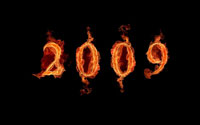This Year's Top 100 List of Global Thinkers Includes No Russians
Foreign Policy, an influential political magazine, published the rating of The Top 100 Global Thinkers who affected mankind the most in 2009. The list includes experts in various spheres who affect public opinion and the world in general. The authors of the project intended to identify people whose intellectual quests shape the world where we live and will live in the future. This year, no Russians whose ideas determined the agenda of 2009 made it to the rating.

This is the third The Top 100 Global Thinkers rating published by the magazine. The first rating was published in 2005, and the last one was released in 2008 in cooperation with the British Prospect Magazine. The rating was called The Top 100 Public Intellectuals and attracted a good deal of criticism from American and British public since the top ten spots of the rating were given to several Muslim leaders with questionable reputation. The current rating also attracted many skeptical responses because of ideological bias and the quality of the material (for example, position No. 40 is missing in the rating whereas there are two positions No. 39; many pictures of personas are missing, etc.)
Ben Bernanke, the chairman of the Federal Reserve, tops The 100 Top Global Thinkers of 2009 for “staving off another Great Depression.” The magazine emphasizes that Bernanke was ranked first not for “single-handedly reinventing the role of a central bank, or for preventing the collapse of the U.S. economy. But to have done all of these within the span of a few months.”The authors of the rating called his achievements in saving the economy “one of the greatest intellectual feats of recent years.”
President Obama was named No. 2 of the global thinkers “for reimaging America’s role in the world.” Ms. Zahra Rahnavard, the wife of the failed Iranian presidential candidate and opposition leader Mir Hossein Mousavi, was ranked No. 3 for “being the brains behind Iran’s Green Revolution.” The American Economist Nouriel Roubini, who allegedly predicted the global economic crisis, was ranked fourth . He is followed by Rajendra Pachauri , an Indian who chairs the Intergovernmental Panel on Climate Change. Bill and Hillary Clinton share sixth place although their intellectual achievements are very different. Cass Sunstein and Richard Thaler, economists from Obama’s team, share No. 7. David Petraeus, a former commander in Iraq, was named No. 8. He is followed by Zhou Xiaochuan, the People's Bank of China governor, who proposed a “new form of synthetic international reserve currency.”
Like in the previous ratings, various Islamic thinkers are given high profile presence in the current one. Sayyid Imam al-Sharif, the former leader of Egyptian Islamists who is currently imprisoned, roundsouttop ten. He is a former commander of the Egyptian terrorist organization al-Jihad and early founder of al Qaeda. While in prison, he wrote a book “Islam without Jihad” (2007) where he revised his previous support for religious war and criticized the ideology of Islamic terrorism from the position of the Islamic theology.
Various economists whose ideas are now in greater demand and experts involved in solving the issues of the climate change are also well represented in the rating. The rating also includes many names of retired politicians who, according to Foreign Policy, shaped the development of the contemporary world, for example, former Vice President Dick Cheney, the former UN Secretary General Kofi Annan, the first President of Czech Republic Vaclav Havel, and others. Since Foreign Policy rating reflects the American point of view, the United States is traditionally represented with more names than other countries. Prevalence of American officials on the top of the list probably has to do with the fact that the magazine is published in Washington DC and highlights the issues of foreign policy.
This year, the Russians did not make it to the rating of global thinkers. In 2005 rating Russia was represented by a political analyst Sergei Karaganov. In 2008, three Russians were on the list, including Garry Kasparov, a chess player and public figure, Yegor Gaidar, an economist, and Lilia Shevtsova, a political analyst. This year, according to Foreign Policy editors, Russia did not have global thinkers. The authors of the rating believe that contemporary Russian thought is not global and world-changing, and Russia itself is not as interesting as it used to be.
Moisés Naím, editor in chief of Foreign Policy magazine, explained the absence of Russians on the list in his analytical article: “A generation ago, dissidents from inside the Soviet Union such as Andrei Sakharov and Aleksandr Solzhenitsyn drew an enormous global following for their ideas on how to resist the totalitarian state. Today, Russian thinkers are absent from our list. …That the Russians are missing may reflect the world's ambivalence about post-Soviet Russia. Sadly, it's also true that while the demand for Russian thinkers may be weak, the supply is also far from booming. These days Russia is simply not a major producer of the kind of ideas the world wants to hear. There are no modern Sakharovs or Solzhenitsyns. If there were, we'd put them on the list.”
Some Russian experts believe that contemporary Russia does not provide premises for global thinking since the country has distanced itself from the “new world order,” criticizing it and looking for “its own ways.” This environment can only bring ideas for internal use not attractive for anyone outside of Russia.
GT Market
Subscribe to Pravda.Ru Telegram channel, Facebook, RSS!





